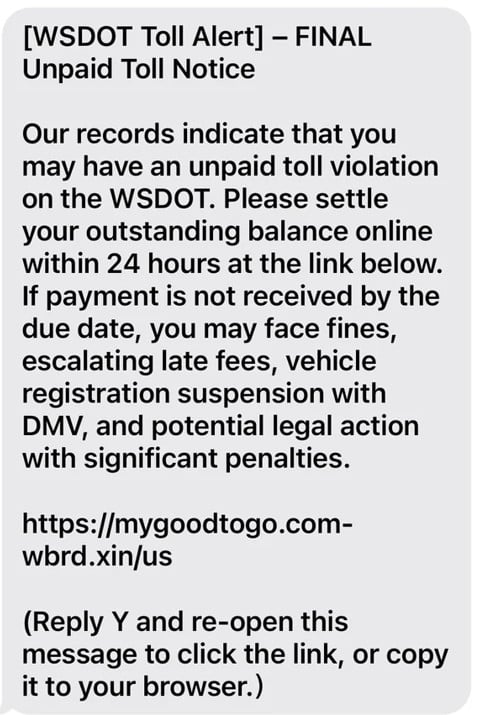In recent times, there has been a surge in a particularly insidious form of phone scam targeting individuals in the State of Washington. The scam, which involves a fake WSDOT final unpaid toll notice text message, is designed to catch its victims off guard and extract their sensitive financial information.
The scam typically begins with a text message claiming to be from the Washington State Department of Transportation (WSDOT), stating that the recipient has an outstanding toll balance that needs to be paid immediately. The message usually includes a demand for payment and a warning that if the balance is not cleared, the recipient’s license plates will be suspended.
Here’s an example of how the scam message might look like: “This is a final notice that you have an outstanding balance of $XX.XX on your toll road account. If not paid, your plates will be suspended. Click on the link below to make payment.”
The key characteristic of this scam is the urgency and the sense of alarm it creates in the recipient. The scammers are counting on their victims to act quickly without thinking twice, which often leads to them losing their hard-earned money and possibly even compromising their financial security.
So, what should you do if you receive a suspicious message like this? First and foremost, do not interact with the message or respond to it. Scammers often use this initial response to get you to click on a link or provide them with sensitive information. Instead, you should report the message to your service provider as spam and then delete it without hesitation.
It’s also essential to verify the authenticity of any official communication from WSDOT or any other public organization. If you’re unsure about a message or notification you’ve received, you can contact the agency directly to confirm its legitimacy. You can usually do this by searching for the agency’s official website or contacting them through their customer service number.
You should also be aware of the common tactics scammers use to convince you of their authenticity. For instance, they might pose as a relative or friend, or even spoof a legitimate number. Be extremely cautious when receiving unsolicited calls or messages, and never respond to any requests for personal or financial information without verifying the identity of the person or organization.
Lastly, it’s crucial to remember that you are not alone in this fight. Many people have fallen victim to this scam, and it’s essential to spread awareness about it to prevent more individuals from falling prey. By being vigilant and taking the necessary precautions, we can all contribute to



